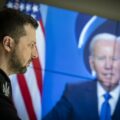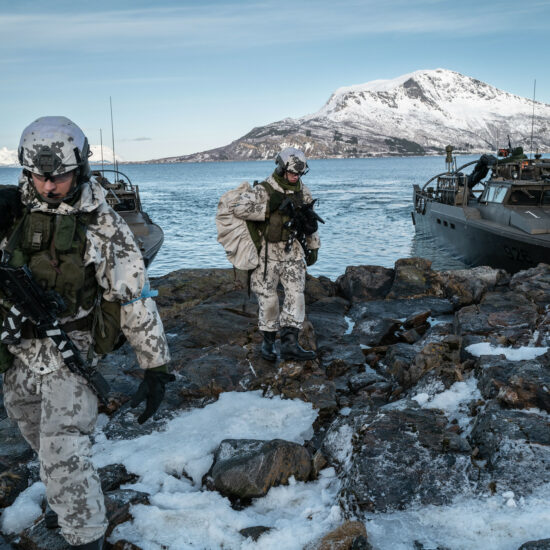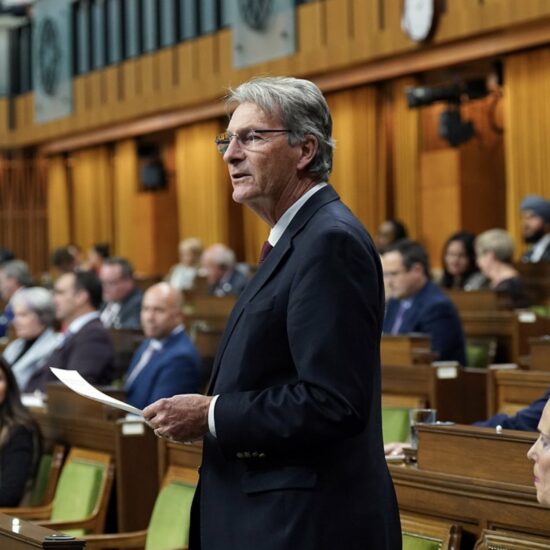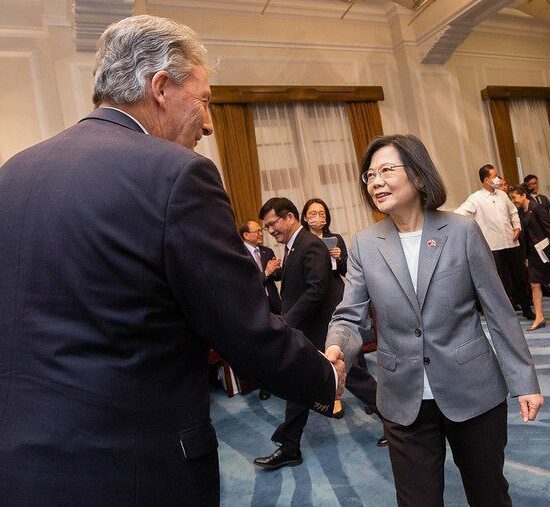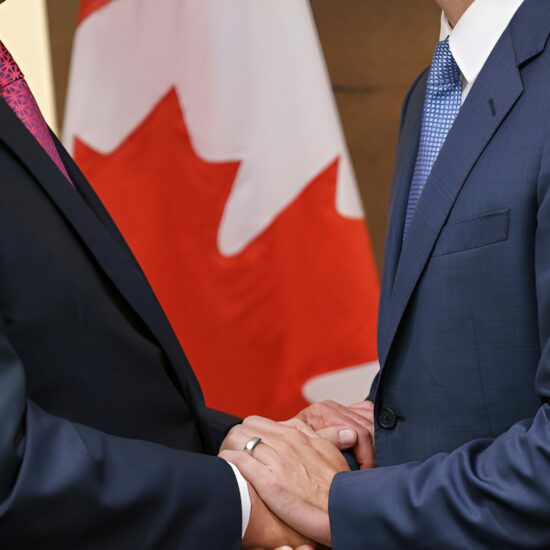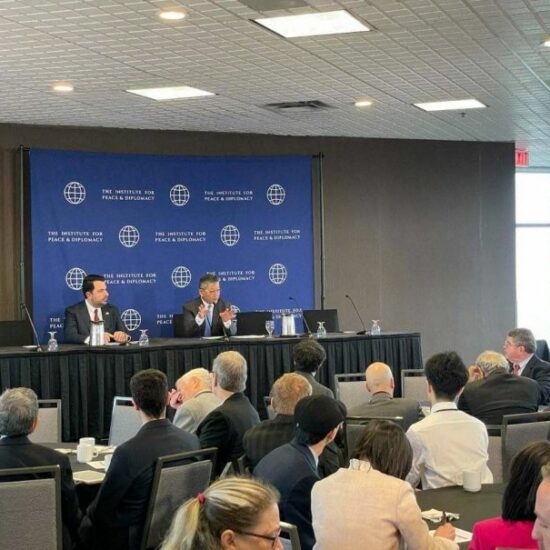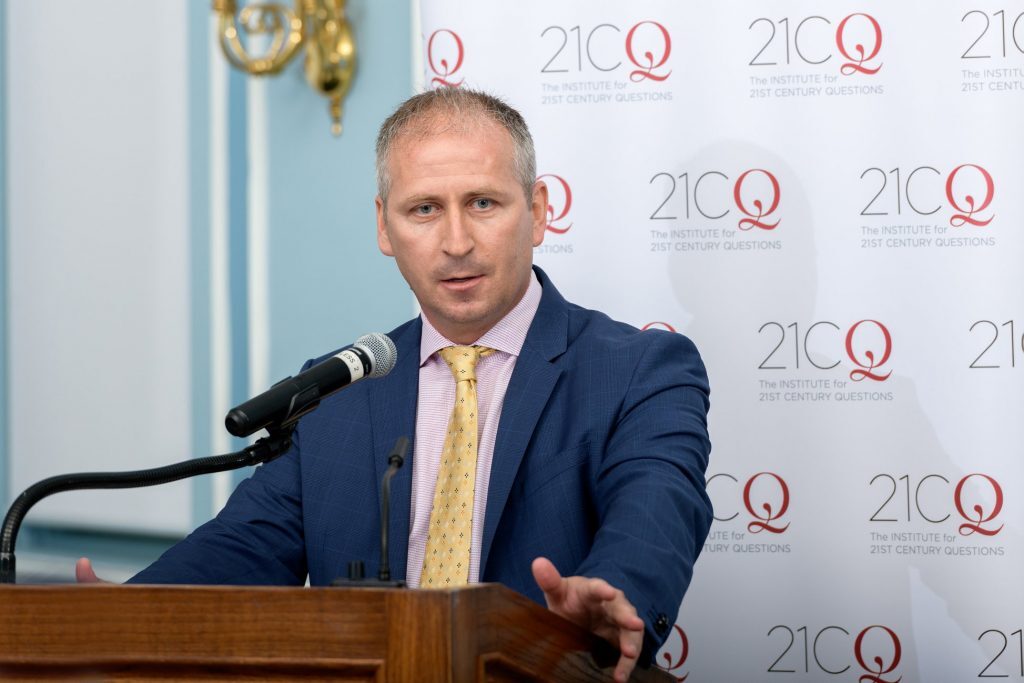
Image credit: Irvin Studin
Institute for Peace & Diplomacy (IPD) interviewed Irvin Studin – President of the Institute for 21st Century Questions, Chair of the Worldwide Commission to Educate All Kids (Post-Pandemic), and Editor-in-Chief & Publisher of Global Brief Magazine – to tackle strategic questions Canada faces in the post-pandemic world. This interview is part of a series of analyses and interviews that IPD is publishing during the Canadian federal election campaign.
Here is an overview of what the interview will cover:
- Canada’s foreign policy challenges
- Implications of a changing international order for Canada
- Canada-US relations
- Canada-China relations
- Arctic affairs
- Intersection of Canadian domestic and foreign policy interests
- Canada’s security and grand strategy
What would you say are the biggest foreign policy challenges facing Canada today?
Our biggest challenge is to survive and exit our current position – legal, political and psychological – as a vassal state to an admirable country and neighbour that is, on all the evidence, declining in its importance in the world and on which we cannot fully rely for protection or to advance many of our basic interests. All of this occurs in the context of increasingly wicked international circumstances for our country – a basic de-stitching of global arrangements during the pandemic, new and difficult borders and border relationships, and an enemy-to-ally ratio that, in demographic terms, is 2-to-1 in our disfavour.
Canada can, by definition, have no foreign policy as a vassal state. And that is where we are today. No leader of international importance visits our country these days because there is nothing to discuss. We have outsourced all decision-making in law, fact and reputation to a foreign capital. So our job – a huge one – is to reinstate a Canada that thinks for itself, underpinned by all the strategy, resources and leadership required by the times.
Are the changes affecting the international order today more profound than those of previous eras? If so, what implications does this bring for Canada?
The pandemic ushered in the end of the post-Cold War period, which had been very kind to Canada, strategically speaking. The present and near-term future will be far less kind, requiring us to think and play at a far higher level if we’re to survive and succeed. No one owes us survival as a country.
The post-pandemic era marks the real start of the Asian century, with China by far the central player in both strategic and economic terms. This Asian century comes on the heels of the aforementioned de-stitching of the post-Cold War globalization that was underwritten by American power, American capital, American talent and, to some extent, American standards.
And yet, as I have argued for the last decade-plus, China is effectively our neighbour – closer to Canada than to Australia, the latter of which typically fancies itself “in Asia”. This means that our current national mental map, which is mostly preoccupied with America, is too primitive for our complex realities. We need to incorporate China to our west and Russia to our immediate north (across the melting Arctic). Europe, in all its diversity, is to our east. The result is an “ACRE” (America-China-Russia-Europe) mental map that has four vectors and, on the math, 15 combinations of pressure and pull across our country’s huge geography and information space. Post-pandemic, unless we play at the right level, we could quickly get crushed or disintegrated by these forces.
How will Canada-US relations evolve in this changing global context? Is closer coordination between Ottawa and Washington needed, or rather should Canada be more cautious about the risks of overdependence on its southern neighbour?
We have two broad options as a country. Either we double down on the vassal position with respect to Washington, which is clearly the present and easier course of affairs, or we “de-vassalize” and “think for ourselves”. This means that Canada’s international affairs cannot reduce to a simple “theory of the border”. After all, that border is still largely closed today.
Of course, thinking for ourselves is hard work and takes time. And it is not certain that we can succeed. But it is, by some margin, the surest way for Canada to ensure its post-pandemic survival and success on its own terms in the context of its 4-point, 15-combination strategic game. It is also, in my submission, the more dignified course, as I find the idea of being vassalized to an unimpressive American decision-making class ever-embarrassing, if not insufferable.
Now, if we double down on the vassal position, consciously or unconsciously, we are making a strategic bet that America will a) protect us in a pinch (again, within our 15-combination game); and b) assure or amplify our other basic national interests. Perhaps it will, perhaps it won’t. Who knows? If we get the bet wrong, we die: Canada does not survive this century. If we get it right, we continue to muddle through, strategically, as a vassal state, where foreign policy is largely tactical or ornamental, but never serious.
Question: What if, given Biden’s present woes, there is to be a Trump 2.0 presidency? Not only another Trump-like administration would not necessarily defend us in a pinch, but could well be predatory on Canada – especially because of our happy vassalization. The easy vaccine access we enjoyed during the pandemic would, in future, come with great conditions and pressure, as would border openings and overall trade relations. Canada’s inability to protect its borders could also create pretexts for American annexation pressures – once thought extinct, but today very much du jour. For example, we tend to think of Russia as our major northern border pressure, but we neglect to understand that it is America that could well run our own Arctic and North on their terms and in their own interests if we do not get our act together – at the right level and at scale.
Canada-China relations have soured rapidly over the past 2-3 years. Can this tendency be reversed? Should it be? What would be required for a course correction in the bilateral relationship?
Given our wicked strategic game, our goal must be to have equal-to-equal, peaceable relations with China. There is nothing foreordained in the current Canada-China disputes. In fact, I see no reason why we can’t have mature, largely friendly relations with China in the coming decades.
Let’s start with a few basics. China is geographically very close to Canada (Whitehorse and Inuvik are closer to Beijing than is Sydney, Australia), but Canada does not really “know” today’s China at all. Why? Because at the very moment of Confederation in the late 19th century, China had just suffered defeat in the second of the Opium Wars. It took China almost a century and a half to recover from that original destabilization, through occupation, civil wars, two World Wars (the second particularly brutal for China), other smaller wars and, finally, terrible internal political turmoil.
That century and a half coincided almost exactly with the modern political life of Canada – meaning that we Canadians do not know what it means to have a stable, sophisticated, prosperous China at the centre of the world and on our doorstep. The Chinese, however, have studied us very carefully over the last several decades – multiplying delegations to our country to learn, study and exchange. We have not reciprocated at all – to our great detriment. No Canadian delegations travel to China – or indeed any number of non-like-minded countries around the world – to learn and contrast, and to bring lessons home. Our incuriosity works, instead, to confine our country to increasingly backward conclusions about our progress – in education, business, public administration, infrastructure, culture and overall national achievement.
The near-term conflict with China is largely of American genesis. While Russia was, in the political and public discourse, enemy number one for Canada after the 2014 Ukrainian Revolution, President Trump, newly elected in late 2016, decided that China was America’s principal adversary. We pivoted, largely unconsciously, with the U.S., particularly in the information (social media) space.
The Meng Wanzhou dispute with China followed directly on Canada’s agreement in the USMCA, for all practical intents and purposes, never to have full-on economic relations with China without the express say-so of Washington. We put this into law – one of the major strategic mistakes in modern Canadian history. I still cannot believe it.
This was seen by Beijing as a full, formal vassalization of Canada and as a major hostile act that presaged the Meng arrest – an arrest happily made by a vassalized power at the request of the superior state (which had declared China enemy number one). The two Canadian Michaels were, to our understanding, arrested in direct retaliation for the Meng arrest and attempted extradition. And the very public attempts by Ottawa – operating not from a 4-point mental map, but instead a simplistic one-point mental map – to get Washington to do our bidding to release the two Michaels only served to confirm, in international minds, the conclusion that Canada is indeed a vassal state.
Righting our relations with China requires tactical and strategic moves by Canada. All of this must take place in the context of our 4-point ACRE game. In the short term, the only way to retrieve the two Michaels is that which should have been done two years ago – to wit, a direct exchange of Meng for the two Michaels. This is perfectly legal and constitutional in Canada, and all the players understand this perfectly well.
However, in order not to “freeze” the relationship at only a prisoner exchange, and not reduce the relationship – optically and substantively – between two big countries to a single transaction, the Meng-Michaels exchange must be couched in a very big, long-term bilateral policy agenda between Ottawa and Beijing. This policy agenda can launch us out of the present dead-end into a future in which two major countries and neighbours – Canada and China – collaborate on infrastructure, people-to-people exchange, business relations, science, academic relations and everything else under the sun. That’s how big countries and big relationships work.
We will surely argue with Beijing regularly on a host of matters, from human rights to public health. But that is par for the course, as it will be with our other neighbours, more familiar to us or not.
Besides the US and China, what is Canada’s most important relationship this century?
Russia, obviously. Like China, Russia is now an immediate neighbour to Canada – right across the fast-melting Arctic. If Canada and Russia are the two Arctic giants of this century, we have every interest in having largely productive, peaceful relations with Russia across a broad sweep of policy areas.
Is Canada doing enough to protect its security and sovereignty in the Arctic? In which areas is it most crucial for Canada to invest when it comes to Arctic affairs (diplomatic, military, etc.)?
I don’t like to call it Arctic “sovereignty”. That’s a defensive term used by southern Canadians for southern consumption, working from an erroneous mental map of our country, and resulting in no action of consequence.
The bottom line is that Canada does not have adequate knowledge, assets and capabilities to secure its interests in the coming decades in the context of an Arctic that is opening up through the melting of the sea-ice and permafrost and that is juxtaposed with huge neighbours with very serious capabilities and interests.
I prefer a far more “offensive” Arctic posture for our country – one that sees the Arctic and our vast North (40% of our country’s territory, and as big as the entire European Union, in territorial terms) – as both the key “exit strategy”, economically and psychologically, from our pandemic catastrophe and as the “centre of the world” in our future economic, transportation, environmental and strategic relations. This would require millions more Canadians in the North and Arctic in the coming decades, whereas our population across our huge three territories is today equivalent to that of Ajax, Ontario.
On this vision of things, the Canadian Arctic no longer becomes marginal or something to be “fortified” or “moated” in defence against imminent attack, but instead the central hub of trade and exchange – by air, sea and road – between Canada and a proximate market of over 2 billion people across three continents and several major trading blocs – more than six times larger than the continental U.S. market alone, but including it as well. This vision of things also activates Western Canada to become far more central, demographically, economically and psychologically, in Canadian affairs.
How do domestic and foreign policy intersect as it relates to Canada’s core strategic interests?
Intimately. In fact, this is one of the great weaknesses in most Canadian foreign policy thinking. We imagine the two spheres to be separate, with foreign specialists looking askance at domestic policy and domestic policy specialists being largely illiterate on matters international.
Real national strategy recognizes that Canada’s international punch is a function of our internal capabilities – just as a boxer punches not with the fingers but rather as a function of his/her torso and overall physical constitution. This, by the way, is very different from the naïve slogan that is occasionally fashionable in Ottawa – “good foreign policy is good domestic policy.”
We cannot have a serious foreign policy if we deliver our punch only through rhetoric or Twitter. This is understood by other countries who surely ask themselves: What capabilities does Canada have behind or beyond the Twitter exclamation? If there is nothing, we are to be ignored.
Canada exits the pandemic with as many as seven national crises of system – a public health crisis, an economic crisis, an education crisis, a national unity crisis, an institutional crisis, and a crisis of historic international weakness. We also have a growing social crisis in the country involving a difficult renegotiation of the norms according to which we agree to live together across our great land.
We need to resolve these crises in parallel and concurrently, recognizing that our international weakness cannot be reversed in the context of great domestic weakness (although domestic strength, absent strategy and thinking, is only a necessary but insufficient condition for international success). The most devastating of these multiple systems crises for our country and its ability to compete internationally in the post-pandemic world is the massive education crisis. A country with very large numbers of uneducated or undereducated citizens will have difficulty mobilizing the talent to become a term-setter among the nations. But that is where we find ourselves at present, barring great political correction.
Does Canada need a “grand strategy” to survive this century’s novel pressures? Or is a more ad hoc approach more likely to safeguard Canada’s security and independence?
For our Canadian purposes, I don’t like the conventional understanding of “grand strategy” as proffered by American military colleges. That understanding suggests that Canada should choose a “goal” or “interest” or “end” to pursue, and that we should prepare or build up national capabilities to defend or support that end.
I don’t think that approach will get us anywhere in Canada, given our vassalized condition – that is, the Americans typically set our ends, whether we realize it or not.
My preference is to privilege the means before determining the ends. Let us invest, conscientiously and at great scale, in demographic assets; diplomatic, military, intelligence and analytical assets; linguistic assets (I have long argued for a proper national languages strategy in Canada); and economic and infrastructural assets over the coming decade and a half, and then we will come to what I believe is a more appropriate determination of what the “ends” or “goals” of a large, major country ought to be.
This is very much the spirit of my 100 million argument a dozen years ago – that is, that a country at 38 million (as today) cannot possibly know how a country at 100 million thinks and behaves. We will know en route and as we get there. But it will be a higher level and ambition of national thinking.
Are the Canadian political and intellectual elite — and Canadians more generally — capable of grand strategic thinking? If not, what needs to change?
Not at present. Most of our political, intellectual, economic and strategic elites are deeply vassalized. How can it be otherwise? We live in a beautiful country – one of the world’s oldest and most sophisticated federal democracies – that has very seldom had to “fight for its life” over the course of a century and a half. We were born as a colony and the colonial instinct has not been shed definitively.
Whether we can shed it now, post-pandemic, when faced with massive crises and pressures, will be a matter of historical interest. I’m certainly cheering for our team.
I would like, ten years from now, for us to have a properly Canadian “school” of strategy – intellectually speaking, with its own vocabulary, concepts and development systems across a far larger and energetic population. That school, like the Canadian hockey player, should never subordinate itself to the schools of other leading countries – many of them our neighbours. It will, instead, help produce a term-setting strategic class, who will help mould a term-setting Canada that thinks for itself in a world that owes us nothing, but in which Canada can be a major force in the human condition.
Irvin Studin is President of the Institute for 21st Century Questions, Chair of the Worldwide Commission to Educate All Kids (Post-Pandemic), and Editor-in-Chief & Publisher of Global Brief Magazine. His forthcoming book is entitled “Canada Must Think for Itself – Ten Theses for our Country’s Survival and Success This Century”.

